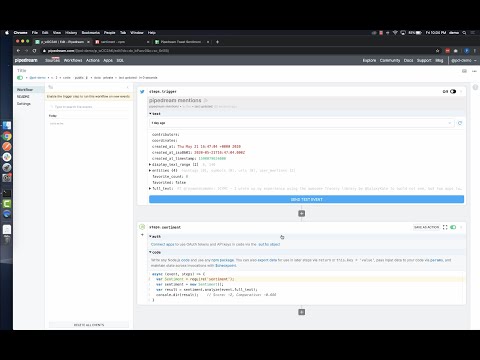What do you want to automate
with Telegram and Google Sheets?
Prompt, edit and deploy AI agents that connect to Telegram, Google Sheets and 3,000+ other apps in seconds.
Trusted by 1,000,000+ developers from startups to Fortune 500 companies
Popular Ways to Connect Telegram with Google Sheets#
Popular Telegram and Google Sheets Triggers#
Emit new event each time a Telegram Bot command is received.
Emit new event each time a channel post is created or updated.
Emit new event each time a Telegram message is created or updated.
Popular Telegram and Google Sheets Actions#
Create an additional invite link for a chat, See the docs for more information
Add a single row of data to Google Sheets. Optionally insert the row at a specific index (e.g., row 2 to insert after headers, shifting existing data down). See the documentation
Add multiple rows of data to a Google Sheet. See the documentation
Edits photo or video messages. See the docs for more information
Overview of Telegram#
The Telegram Bot API allows you to build bots that can interact with users on the Telegram platform. Using Pipedream, you can automate messaging, handle commands, and trigger actions based on conversations or alerts. Pipedream's serverless execution model enables you to create complex workflows involving Telegram messages without managing any infrastructure. With Pipedream's integration, you can process inbound messages, send outbound notifications, and connect the Telegram Bot API with numerous other services to create powerful automation solutions.
Connect Telegram#
import { axios } from "@pipedream/platform"
export default defineComponent({
props: {
telegram_bot_api: {
type: "app",
app: "telegram_bot_api",
}
},
async run({steps, $}) {
return await axios($, {
url: `https://api.telegram.org/bot${this.telegram_bot_api.$auth.token}/getMe`,
})
},
})
Overview of Google Sheets#
The Google Sheets API allows for the creation, reading, updating, and deletion of data within Google Sheets, enabling a robust platform for spreadsheet management and data manipulation. Through Pipedream, you can craft serverless workflows that respond to various triggers, such as webhook events, emails, or scheduled times, to interact with Google Sheets. This synergy can automate reporting, synchronize data across applications, manage inventory, track leads in a CRM, or even conduct survey analysis by updating and retrieving sheet data on the fly.
Connect Google Sheets#
import { axios } from "@pipedream/platform"
export default defineComponent({
props: {
google_sheets: {
type: "app",
app: "google_sheets",
}
},
async run({steps, $}) {
return await axios($, {
url: `https://www.googleapis.com/oauth2/v1/userinfo`,
headers: {
Authorization: `Bearer ${this.google_sheets.$auth.oauth_access_token}`,
},
})
},
})
Related Videos#



Community Posts#


